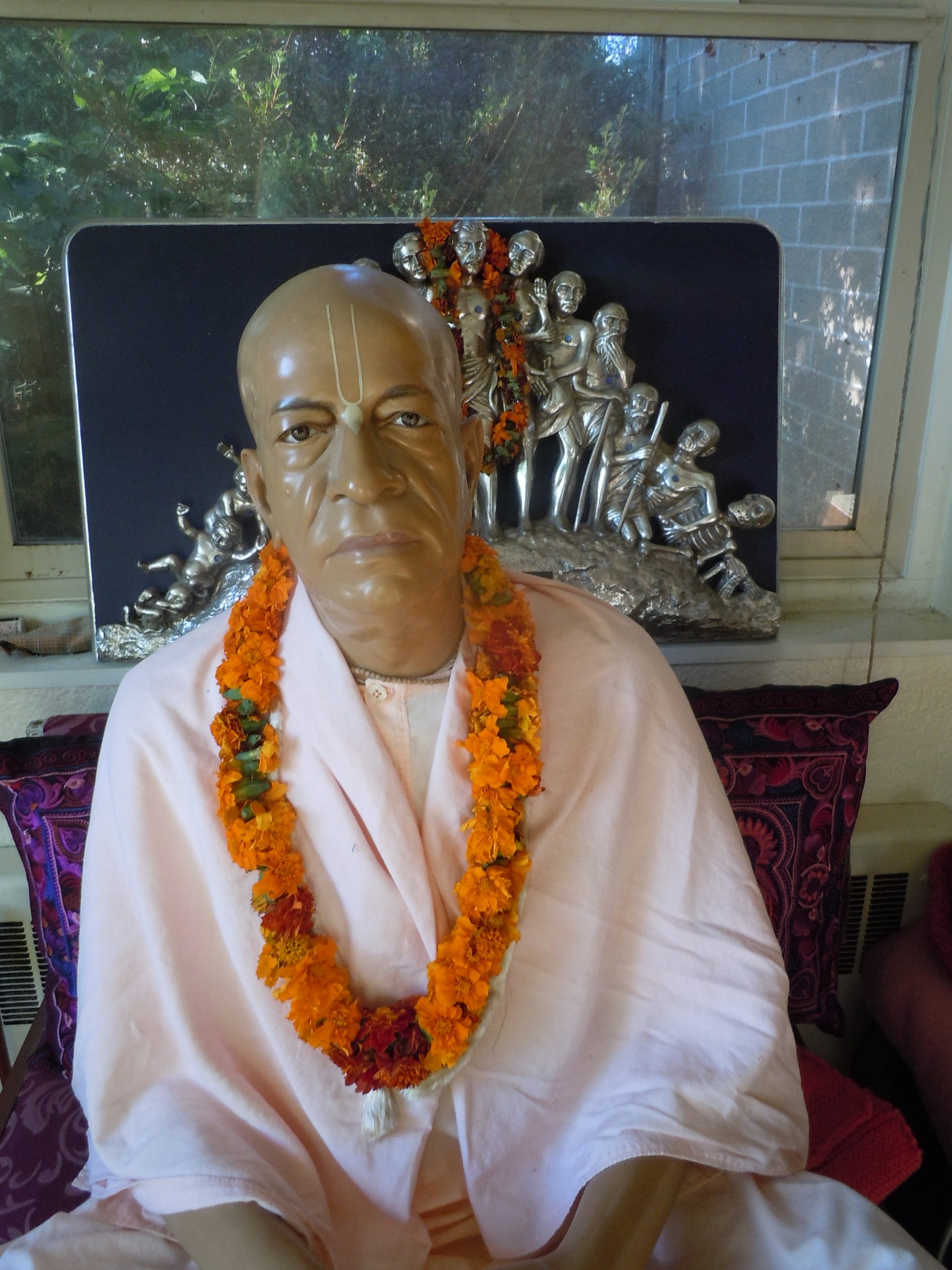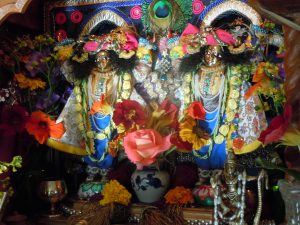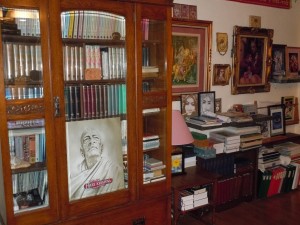Hare Krsna-Below is a wonderful morning walk conversation with Srila Prabhupada over the idea we are not these material bodies. They also discuss what is the cause of death-heart attack, car accident, or just that the body is wearing out? In the end after nicely defeating all the karmi arguments, Srila Prabhupada tells us that philosophy is not to be discussed with the common man as they will not understand. Better to give him kirtan and prasadam and little by little they will come to understand it all. Everyone will like kirtan, dancing and Krsna prasadam.
I feel the same is true of guru tattva as many devotees cannot yet understand it because they have not taken sufficient time in reading the books. Nor have they been yet blessed by Srila Prabhupada or Lord Krsna as Paramatma.
damaghosa das
—————————–




Oct 4 1975 Mauritius morning walk conversation on you are not this body
Prabhupāda: But the size of the body has changed.
Brahmānanda: The size has changed. It has grown, increased.
Puṣṭa Kṛṣṇa: It looks different, completely… It looks different. There is no similarity.
Prabhupāda: Yes. There is no similarity. Why the child… There was no mustaches. Why you have mustaches? How you can say “The same body”? You shall have to give your own argument. Child had no mustaches; you have got now mustaches. How you can say the same body? The child had no sex desire; now you have got sex desire.
Brahmānanda: They would say all these things are dormant within the child’s body, and now they are coming out.
Prabhupāda: That we also say, but that body not… That “dormant” means dormant in the soul, not in the body. That is the knowledge. Dormant it is, but dormant in the soul, not in the body.
Puṣṭa Kṛṣṇa: They have to admit that it’s a different body because if the body is simply made of food and they are eating so much and evacuating so much, then it has to be a different body.
Prabhupāda: No, it is different body, undoubtedly. If they foolishly argue, that is different thing. Therefore rascal. Their argument has no value. How you can be the same body? So many changes. The body is changed. (to Indian man:) What is that? It was not garam?
Indian man (1): No, garam not.
Prabhupāda: So this argument, how he can refute, that he has died twenty-two years?
Puṣṭa Kṛṣṇa: Well, he can also say that he has lived twenty-two years, because he has no perception of any life before that time. He can’t remember living before.
Brahmānanda: “Before, I was not alive. Now I am alive, so I have lived for twenty-two years. Before, I was dead; I was not alive. Now I am alive, so I’ve been alive for twenty-two years.”
Prabhupāda: So before, you were not alive. Then how your life came?
Puṣṭa Kṛṣṇa: The combination of…
Prabhupāda: Do it. Again foolishness. These rascals… (laughs) Then, if you can create life, then where is the question of dead body? You create again. Give life again. If you are so competent that you can give life, combination, then this dead body is there. You bring chemicals and inject.
Puṣṭa Kṛṣṇa: The same chemicals are there, too. The same chemicals, living body, dead body—five minutes before, five after—is the same chemicals. But they can’t explain why there is such a drastic difference.
Prabhupāda: What is that same chemical?
Puṣṭa Kṛṣṇa: In the living body, two minutes before death and two minutes after…
Prabhupāda: So what is that? Name that, what is that chemical. Then bring it.
Puṣṭa Kṛṣṇa: Let him try and make life. Not possible.
Prabhupāda: If you know the chemical, then you bring it. Chemical is available. Why this is dead? What they will answer? What this chemical is wanting, that it is dead?
Brahmānanda: Well, we may not know…
Prabhupāda: Then, you rascal, why you are talking? You do not know. (laughter)
Brahmānanda: But, then, neither do you know.
Prabhupāda: Huh? No…
Brahmānanda: You can say soul, but you don’t…
Prabhupāda: No. But you cannot answer my question; therefore you are more rascal than me. You cannot answer. Your… You are…
Harikeśa: You have the position. He’s in a position. He cannot answer.
Prabhupāda: Yes. You say that chemical is missing. I say what is that chemical?
Puṣṭa Kṛṣṇa: No, but the chemical is not missing.
Prabhupāda: Then?
Puṣṭa Kṛṣṇa: The same chemical is there. Two minutes before death and two minutes after death, the body chemistry has not changed so much.
Prabhupāda: No. What is that missing that it is dead?
Puṣṭa Kṛṣṇa: They can’t answer.
Prabhupāda: Therefore they are fool. You cannot answer.
Puṣṭa Kṛṣṇa: Because it’s not a question of chemical. Actually they don’t know what life is.
Prabhupāda: Therefore they are foolish. Therefore he has to take knowledge from Kṛṣṇa: dehino ‘smin yathā… “Within this body there is soul.”
Brahmānanda: You say there’s a soul, but we’ve never seen a soul. It may be your imagination.
Prabhupāda: You may not see. You have not seen your forefather. That does not mean… This is all bad argument. Why do you believe? Your eyes are so imperfect; still, you say, “I did not see. I want to see.” What is the value of your eyes? You see the sun globe—a small disc. But is it so? Then how do you know that it is so big?
Puṣṭa Kṛṣṇa: By hearing.
Prabhupāda: By hearing. That is important, not by seeing. Therefore śruti, Veda, is important, not your eyes.
Harikeśa: When people die, though, there is usually some cause. Like they have a heart attack or they get hit by a car or some disease. So that death is caused by the disease…
Prabhupāda: That is not the cause. That is the effect. You foolish, do not know. You are taking it, cause.
Harikeśa: Well, when you get hit by a car, that’s a cause.
Prabhupāda: Just like one man becomes insolvent, loses everything. So he said that “I had no money. Therefore I become insolvent.” But that is not the fact. He could not manage; therefore there was scarcity of money and he became failure. So that is effect. On account of his bad management, he came to a position that he could not pay to his creditor, and his business is failure. So that insolvency is not the cause. It is the effect.
Puṣṭa Kṛṣṇa: Bhīṣma was able to remain in his body even on a bed of arrows.
Prabhupāda: So when you are going to die, these are the… On account of imminent death, these are the effects.
Harikeśa: But that means that the body breaks down.
Prabhupāda: Hm?
Harikeśa: The body breaks down.
Prabhupāda: At a certain period it will break.
Harikeśa: So that is the cause, the body breaking down.
Prabhupāda: Yes. So you say heart failure is the cause. No. The body is breaking; therefore heart failure.
Harikeśa: So death means the body breaks.
Prabhupāda: No, no. First of all your answer… You say the heart failure is the cause. The man is dying. I say that because the man is dying, the heart is failure. So heart failure is not the cause. It is the effect.
Harikeśa: That’s very difficult…
Puṣṭa Kṛṣṇa: Because his karma in that body is running out, he has to leave.
Brahmānanda: But if I can get some machine that will make the heart keep on beating, then the man won’t die.
Prabhupāda: No. That you are failure. You have got so many machines. You go on, keeping the heart going on. That is not possible.
Harikeśa: Finally they just pull out the plug. The doctor kicks the plug one day.
Prabhupāda: (laughs) Yes.
Brahmānanda: At the present moment, I was reading, there is one girl in America, New Jersey, teenage girl. And for some unknown reason she went to sleep one night, and in the morning she did not wake up. So they then rushed her to the hospital, and they have an artificial machine that is keeping her alive, and this has been going on for one month. All of her bodily functions are becoming more and more diminished, but still, by this machine, she is alive. Now this has gone on for one month. So now they don’t know what to do with her. Should they keep her like this, just running on the machine, or should they stop the machine and then she will die? This is a big legal problem. They don’t know what… If they stop the machine, they’ll be accused of manslaughter.
Puṣṭa Kṛṣṇa: Some Catholic priest said that better to let her die, because this is God’s way.
Prabhupāda: Then he has to accept the God’s way and give up the machine.
Puṣṭa Kṛṣṇa: But in a situation like that, isn’t it more valuable to preserve human life because there’s the chance…
Prabhupāda: What is the use?
Puṣṭa Kṛṣṇa: There’s a chance that somehow or another, they might be…
Prabhupāda: Why should you take the chance? You are perplexed with overpopulation. And why you want to stay? One side, you are perplexed with overpopulation. Let him die.
Puṣṭa Kṛṣṇa: But they can use the argument that you’re saying that human life is simply for Kṛṣṇa consciousness or God consciousness.
Prabhupāda: No, from his argument, why should you try to keep it? Let him die.
Cyavana: They are afraid of death. No one wants to die.
Puṣṭa Kṛṣṇa: They are afraid someone will take them off the machine, too.
Cyavana: We want to live as long as we can.
Prabhupāda: Then you have to accept that your killing child, abortion, that is sinful.
Cyavana: It’s easier for the mind to accept what is apparent to the senses. For example, to accept that I am this body is easier for my mind than to accept a philosophy which you say that we are not this body. That is very difficult for my mind to accept, whereas I can accept very immediately that I am this body.
Prabhupāda: Because it is difficult, therefore you are a fool. That proves that you are a fool.
Cyavana: Why should I strive for something so difficult, such a philosophical understanding, when I can live very happily with this body?
Prabhupāda: But because you do not want to die. You want happiness.
Cyavana: So I can enjoy this body.
Prabhupāda: You cannot. That is the difficulty. You want, but you cannot. You want. That I know. But you cannot do it.
Harikeśa: You never see happy people.
Prabhupāda: That is their ignorance. They are accepting unhappiness as happiness.
Brahmānanda: Well, in this world there has to be some unhappiness and there has to be some happiness.
Prabhupāda: But we are trying to give you happiness only, no unhappiness.
Cyavana: But that’s not possible.
Brahmānanda: That’s artificial.
Prabhupāda: That you say, but we know.
Cyavana: We cannot see.
Prabhupāda: You cannot see, but you will see if you be trained up. That is Kṛṣṇa consciousness movement.
Cyavana: But it is easier for us to remain here and enjoy a little bit and accept a little suffering, accept this body.
Prabhupāda: Therefore Kṛṣṇa said that “Bhagavad-gītā should be discussed amongst My devotees, not amongst the rascals.” It will be waste of time. Ya imaṁ paramaṁ guhyaṁ mad-bhakteṣv abhidhāsyati. Find out this verse.
Puṣṭa Kṛṣṇa: ya idaṁ paramaṁ guhyaṁ mad bhakteṣv abhidhāsyati bhaktiṁ mayi paraṁ kṛtvā mām evaiṣyaty asaṁśayaḥ [Bg 18.68]
“For one who explains the supreme secret to the devotees, devotional service is guaranteed, and at the end he will come back to Me.”
Prabhupāda: Not to the fools and rascals. So first of all, to give them chance, let them come to the temple, take prasādam, hear saṅkīrtana, offer obeisances by imitating others. In this way, when they become little devotee, then instruct. Otherwise it will be useless. You’ll waste your time by arguing.
Puṣṭa Kṛṣṇa: You have given the example that the field has to be plowed before the seed is sown, cultivated.
Prabhupāda: Yes.
Cyavana: The mind has to want that higher taste.
Prabhupāda: Ceto-darpaṇa-mārjanam [Cc. Antya 20.12]. So this process… Bring the… Invite them. Chant Hare Kṛṣṇa, dance, give them prasādam. Everyone will take part in this way, not immediately instructing that “You are not this body; you are soul.” He will not be able to.
Cyavana: It’s too difficult.
Prabhupāda: Therefore this process is recommended. Caitanya Mahāprabhu argued with Sarvabhauma Bhaṭṭācārya, Prakāśānanda Sarasvatī, not with ordinary public. Ordinary public—”Go on chanting Hare Kṛṣṇa and dancing.” Never argued, neither He discussed Bhāgavatam. For ordinary public-four hours’ kīrtana, chanting and dancing, bas. And then give them sufficient prasādam: “Take prasāda.” This process… Because unless he has got little śraddhā, he will simply put some false argument and waste your time. Not in the beginning. Mad-bhakteṣv abhidhāsyati. First of all create him a devotee a little. Chant Hare Kṛṣṇa-harer nāma harer nāma harer nāmaiva kevalam [Cc. Ādi 17.21]—only. Because this is Kali-yuga, people are so fallen, so downtrodden, so rascal, cats and dogs. It is very difficult. But this process—chanting of Hare Kṛṣṇa mahā-mantra, giving them chance to hear it and take prasādam—that will cure. And that is easily accepted by anyone. It doesn’t matter what he is. Anyone will accept. To chant and dance and take prasādam—no one will disagree. So this is the process.


